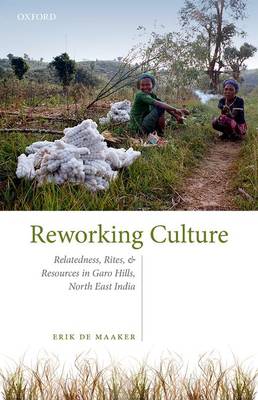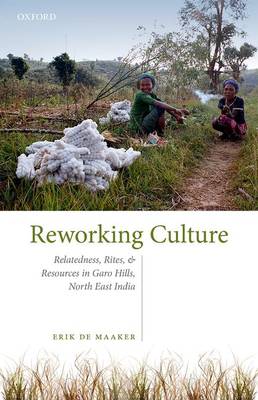
Je cadeautjes zeker op tijd in huis hebben voor de feestdagen? Kom langs in onze winkels en vind het perfecte geschenk!
- Afhalen na 1 uur in een winkel met voorraad
- Gratis thuislevering in België vanaf € 30
- Ruim aanbod met 7 miljoen producten
Je cadeautjes zeker op tijd in huis hebben voor de feestdagen? Kom langs in onze winkels en vind het perfecte geschenk!
- Afhalen na 1 uur in een winkel met voorraad
- Gratis thuislevering in België vanaf € 30
- Ruim aanbod met 7 miljoen producten
Zoeken
Reworking Culture
Relatedness, Rites, and Resources in Garo Hills, North East India
Erik de Maaker
Hardcover | Engels
€ 112,95
+ 225 punten
Omschrijving
Reworking Culture: Relatedness, Rites, and Resources in Garo Hills, North-East India provides intimate insights into the lives of hill farmers and the challenges they face in day-to-day life. Focussing on the reinterpretation of traditions, or customs, the book critiques the all too often taken for granted assumption that upland societies are characterised by cultural homogeneity and strong internal cohesion. Based on extensive ethnographic fieldwork, the book focuses on a rural area in which land continues to constitute the most important resource that people have access to, and that has a substantial number of followers of traditional Garo community religion. In doing so, the book explores the creation and continuing reinterpretation of the multiple relationships through which people are connected to one another, as well as to their environment. These relationships are embedded in normative frameworks that are demanding, yet leave room for ambiguity and negotiation. Far from being immutable, these need to be constantly expressed, (re-)interpreted and enacted. Reworking Culture shows how what people perceive as tradition, is continuously revised and reworked in response to new economic and political opportunities, as well as to changes in the ontological landscape.
Specificaties
Betrokkenen
- Auteur(s):
- Uitgeverij:
Inhoud
- Aantal bladzijden:
- 328
- Taal:
- Engels
Eigenschappen
- Productcode (EAN):
- 9788194831693
- Verschijningsdatum:
- 2/01/2023
- Uitvoering:
- Hardcover
- Formaat:
- Genaaid
- Afmetingen:
- 148 mm x 221 mm
- Gewicht:
- 435 g

Alleen bij Standaard Boekhandel
+ 225 punten op je klantenkaart van Standaard Boekhandel
Beoordelingen
We publiceren alleen reviews die voldoen aan de voorwaarden voor reviews. Bekijk onze voorwaarden voor reviews.









